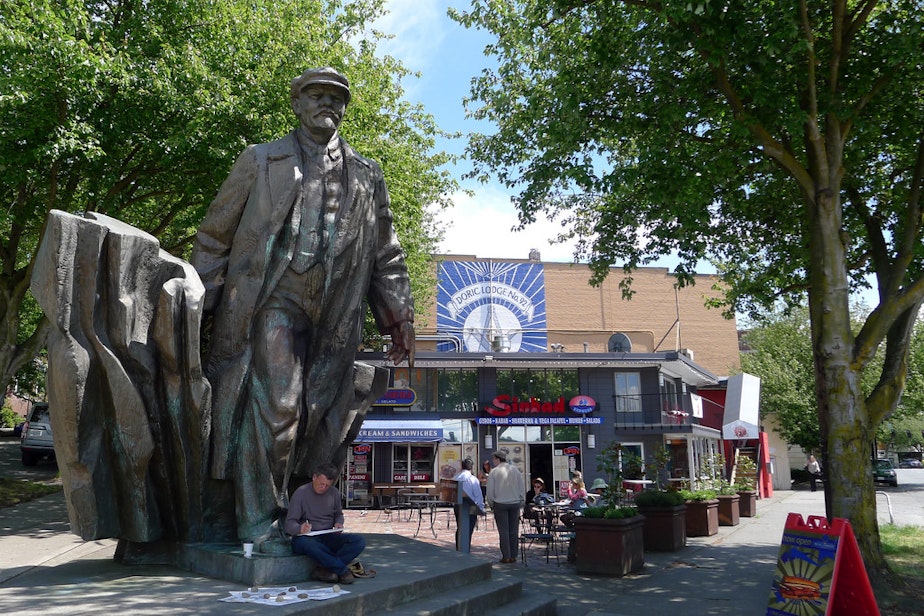Lenin statue in Fremont could come down if Republican bill succeeds

Seattle’s Fremont neighborhood is a bastion of beloved public artwork, from the huge bust of a Troll lurking under the Aurora Bridge to Richard Beyers’ “Waiting for the Interurban,” frequently festooned with balloons, costumes or hand-lettered banners celebrating weddings, birthdays or other special occasions.
While some art lovers look down their noses at the monument to children’s television icon J. P. Patches, the replica of a rocket and other sculptures, Fremont’s public art has a bevy of defenders.
But a group of state lawmakers is not among them. If they have their way, one of Fremont’s signature artworks, the 16-foot-tall statue of former Soviet leader Vladimir Lenin, will come down.
This week a group of Republicans has introduced House Bill 2120. It seeks to remove the bronze monument and replace it with another artwork. The measure would set up a statewide committee to determine the new artwork, which would then be subject to a series of public hearings, at least two of would be held east of the Cascade mountains.
The bill cites Lenin’s role in the formation of the Soviet Union, and atrocities committed under the auspices of that government, including the “Red Terror of 1917-1922” and the deportation and genocide of Crimean Chechens and Tatars. Sponsors conclude that Vladimir Lenin “does not meet the standards of being one of our 15 state's top honorees with a statue display in Seattle.”
The bill caught many in Fremont by surprise. Longtime Fremont businesswoman Suzie Burke, the neighborhood’s largest industrial land owner, was quick to point out that not one of the bill’s sponsors lives in the Seattle area.
Sponsored
“Because if there had been someone from here, I would have called them up and said ‘Why don’t you come down and talk about it?’”
Burke points out that the bronze sculpture is privately owned, and sits on private property. The sculpture was created in 1988 in the former Czechoslovakia; in 1993 a Seattle artist discovered it in a scrap yard and shipped it home. The artwork has been for sale since then, although the owners have declined purchase offers.
Burke says the Legislature doesn’t have the authority to order its removal.
“If the Washington State Legislature wants to buy it, but not with MY money, they can melt it down and make a statue of almost anything they wanted to,” Burke says. “The trouble is they can’t necessarily put whatever they want back on that particular piece of private property.”
One of the bill's sponsors, Rep. Brandon Vick, a Vancouver Republican, says he's a staunch supporter of private property rights.
Sponsored
In an email, Vick said HB 2120 was a somewhat tongue-in-cheek response to a Senate bill introduced earlier this year that would create a committee to consider a monument in the State Capitol to Marcus Whitman, a physician and missionary.
"Personally, I am not in favor of the removal of public or private statues and monuments," Vick wrote. "Our history is our history, and it does no good to try and hide from it."
Two years ago, former Seattle mayor Ed Murray broached the possibility of relocating the Lenin sculpture, citing the national consideration of public monuments to the Confederacy.
Burke and her family have been Fremont fixtures themselves for more than 80 years. Over the decades she’s watched the neighborhood’s transformation into a tech hub, home to Adobe, Tableau Software and a large Google outpost. She believes the quirky art helps Fremont retain its sense of history.
“Fremont has the heart and soul of a working class neighborhood,” Burke says. “Part of our working class is a bunch of artists.”
Sponsored
House Bill 2120 was introduced Monday. It is now in the State Government and Tribal Relations Committee.




